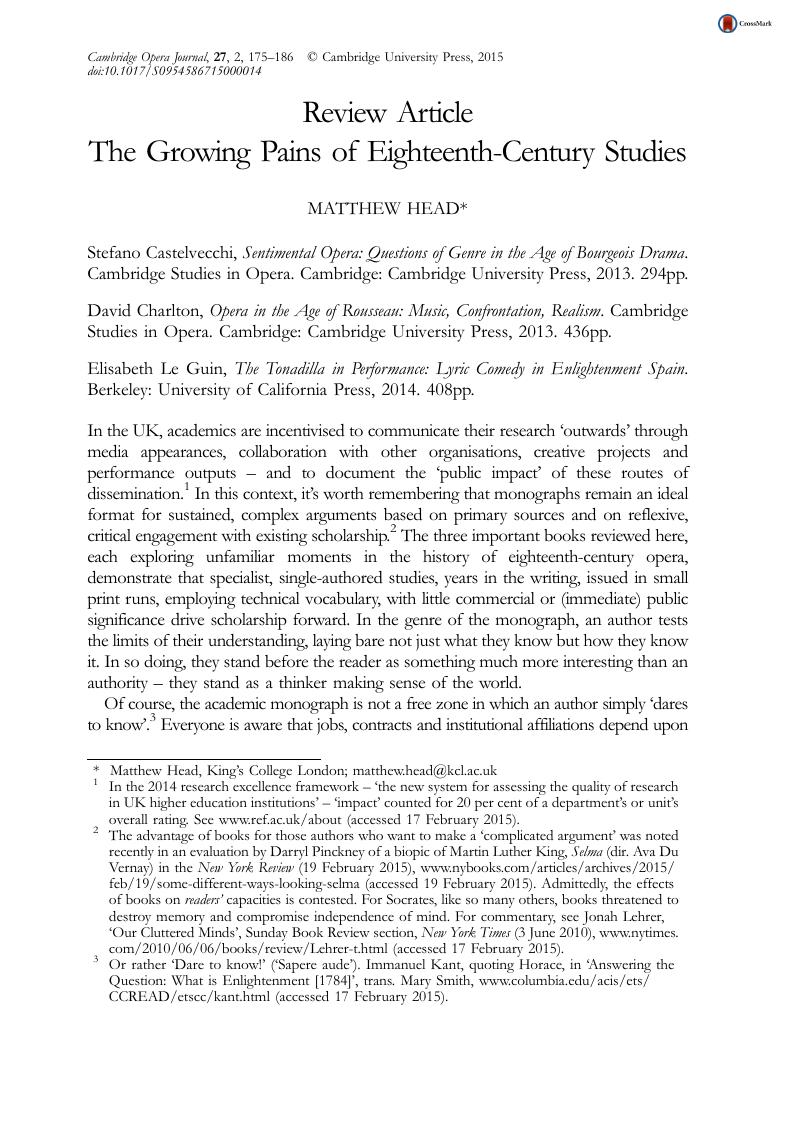Published online by Cambridge University Press: 31 July 2015

Matthew Head, King’s College London; [email protected]
1 In the 2014 research excellence framework – ‘the new system for assessing the quality of research in UK higher education institutions’ – ‘impact’ counted for 20 per cent of a department’s or unit’s overall rating. See www.ref.ac.uk/about (accessed 17 February 2015).
2 The advantage of books for those authors who want to make a ‘complicated argument’ was noted recently in an evaluation by Darryl Pinckney of a biopic of Martin Luther King, Selma (dir. Ava Du Vernay) in the New York Review (19 February 2015), www.nybooks.com/articles/archives/2015/feb/19/some-different-ways-looking-selma (accessed 19 February 2015). Admittedly, the effects of books on readers’ capacities is contested. For Socrates, like so many others, books threatened to destroy memory and compromise independence of mind. For commentary, see Jonah Lehrer, ‘Our Cluttered Minds’, Sunday Book Review section, New York Times (3 June 2010), www.nytimes.com/2010/06/06/books/review/Lehrer-t.html (accessed 17 February 2015).
3 Or rather ‘Dare to know!’ (‘Sapere aude’). Immanuel Kant, quoting Horace, in ‘Answering the Question: What is Enlightenment [1784]’, trans. Mary Smith, www.columbia.edu/acis/ets/CCREAD/etscc/kant.html (accessed 17 February 2015).
4 On opera as going to the opera, rather than what happens on stage alone, see Kotnik, Vlado, ‘The Adaptability of Opera: When Different Social Agents Come to Common Ground’, International Review of the Aesthetics and Sociology of Music 44 (2013), 303–342 Google Scholar.
5 My reference here is to such organisations as The British Society for Eighteenth-Century Studies and The International Society for Eighteenth-Century Studies. Several university presses issue series under the rubric of eighteenth-century studies, notably Johns Hopkins University Press, which also issues the journal Eighteenth-Century Studies. In the UK, research centres and programmes in eighteenth-century studies exist at the Universities of Birkbeck, Kent, King’s College London, Queen Mary, Sheffield, Southampton, York and Warwick (with apologies for any omissions). In musicology, post-formalist approaches to later eighteenth-century music informed by eighteenth-century studies were fostered by several pioneers, including Mary Hunter, Annette Richards and Elisabeth Le Guin.
6 In focusing specifically on issues of understanding and presentation in studies of eighteenth-century opera, I avoid broader exhortation about the future of musical scholarship in general. There are ethical problems in that now exhausted and grandiose genre of writing (‘the future of musicology’) which flourished in the late nineteenth and twentieth centuries, in German-speaking lands and the United States particularly, always following and exercising power. Consider, for example, that authors in that genre – however impersonal their tone – tend to discover the future in their own example, and in their own disciplinary or multidisciplinary context. As things stand, discourse on ‘the future of musicology’ is too invested in notions of progress, is self-absolutising, and is insufficiently sensitive to current and future difference.
7 ‘Sentimental Opera: The Emergence of a Genre, 1760–1790’, University of Chicago (1996).
8 ‘From Nina to Nina: Psychodrama, Absorption and Sentiment in the 1780s’, Cambridge Opera Journal 8 (1996), 91–112.
9 ‘Pamela: The Offspring of Richardson’s Heroine in Eighteenth-Century Opera’, Mosaic 18 (1985), 61–76.
10 Understanding Media: The Extensions of Man (New York, 1964).
11 ‘Music – Drastic or Gnostic?’, Critical Inquiry 30 (2004), 505–36.
12 Future studies might explore the tension between the pervasive metatheatricality of comic opera and the idealism about (untutored and spontaneous) ‘singing’ that is present in some of the operas discussed by Castelvecchi and Charlton – operas touched by ideals of music as a natural language of the passions.
13 Born, Georgina, ‘For a Relational Musicology: Music and Interdisciplinarity, Beyond the Practice Turn’, Journal of the Royal Musical Association 135 (2010), 205–243 CrossRefGoogle Scholar.